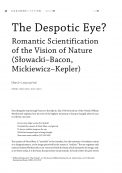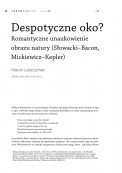Marcin Leszczyński – 1979, Polish and English philologist, assistant professor at the Department of Comparative Studies of the Institute of Polish Literature at the University of Warsaw. His research interests include Polish and English Romantic literature, comparative literary studies, comparative discourse studies, literature and science studies. He is the author of: “Lutnia szalonego barda”. Metaliterackie aspekty poematów dygresyjnych Byrona i Słowackiego [‘Lute of a mad bard:’ Metaliterary aspects of digressive poems by Byron and Słowacki] (2014) and the co-editor of Poemat dygresyjny Juliusza Słowackiego. Struktura, konteksty, recepcja [Juliusz Słowacki’s digressive poem: Structure, contexts, reception] (2011; co-editor: M. Kalinowska) and Między dyskursami, sztukami, mediami. Komparatystyka jutra [Between discourses, arts, media: Comparative studies of tomorrow (2017; co-editors: E. Szczęsna, P. Kubiński).
Marcin Leszczyński (1979) – doktor nauk humanistycznych, polonista i anglista, adiunkt w Zakładzie Komparatystyki Instytutu Literatury Polskiej na Uniwersytecie Warszawskim. Obszary zainteresowań: polska i angielska literatura okresu romantyzmu, komparatystyka literacka, komparatystyka dyskursów, związki literatury i nauki. Autor książki „Lutnia szalonego barda”. Metaliterackie aspekty poematów dygresyjnych Byrona i Słowackiego (2014), współredaktor tomów: Poemat dygresyjny Juliusza Słowackiego. Struktura, konteksty, recepcja (2011; razem z M. Kalinowską) oraz Między dyskursami, sztukami, mediami. Komparatystyka jutra (2017; razem z E. Szczęsną i P. Kubińskim).

A b s t r a k t
The article discusses and deconstructs the nature-culture dichotomy, examining how the image of nature in Romanticism was filtered through cultural matrices, especially in connection with the development of natural sciences, and the concept of cognition, which was most often perceived as based on the senses. (...)

A b s t r a k t
Artykuł prezentuje, dekonstruując dychotomię natura–kultura, jak w okresie romantyzmu obraz natury filtrowany był przez kulturowe matryce – zwłaszcza związane z rozwojem nauk ścisłych, a więc z poznaniem, które postrzegano najczęściej jako oparte na zmysłach, czysto materialne. (...)







